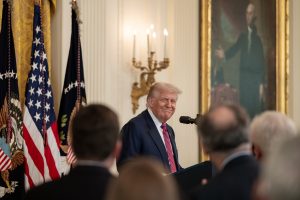Is Trump coming? The question has come to dominate the run-up to the Association of Southeast Asian Nations (ASEAN) summit and related meetings at the end of the month, threatening to divert attention from issues such as the South China Sea disputes and the civil war in Myanmar.
Between October 25 and October 28, leaders of the 10 ASEAN member states will gather in Kuala Lumpur for the 47th ASEAN Summit and related meetings. In addition to the week’s various ASEAN-only meetings and bilateral summits between the Southeast Asian bloc and its major external partners, the bloc will also host the East Asia Summit, which will bring together the 10 ASEAN member states and eight external partners: the United States, China, Russia, South Korea, Japan, India, Australia, and New Zealand.
As this year’s chair of the Southeast Asian bloc, Malaysia’s government has gone to great lengths to secure high-level participation, with an aim to organize the “largest and most high-profile gathering of world leaders to date,” Channel News Asia reported last week.
Among those who have confirmed their attendance are Brazilian President Luiz Inacio Lula da Silva, South African President Cyril Ramaphosa, and Indian Prime Minister Narendra Modi. China’s President Xi Jinping will reportedly skip the summit, having visited Malaysia in April, and China will be represented by Premier Li Qiang. Russian President Vladimir Putin’s attendance is yet to be confirmed.
At the end of July, Malaysian Prime Minister Anwar Ibrahim announced that U.S. President Donald Trump had accepted an invitation to attend the summit, although the Trump administration has yet to confirm his attendance. Politico reported last week that Trump was willing to attend, with one condition: that he gets to preside over the ceremonial signing of a peace agreement between Cambodia and Thailand on the sidelines of the summit. The report, which was based on “three people familiar with those plans,” also claimed that Trump had explicitly requested that Chinese officials be excluded from the ceremony.
Trump claims to have played an important role in brokering the ceasefire that ended five days of fighting along the Cambodia-Thailand border in late July, listing the conflict among the “seven un-endable wars” that he supposedly brought to a close. Leaving aside the question of whether Cambodia and Thailand are ready to sign a binding peace agreement, or whether such an agreement would have any more than symbolic significance, such a ceremony would give Trump “an international platform to trumpet his bona fides as ‘peacemaker-in-chief,’” as Politico stated.
In comments to Politico, a senior Trump administration official denied that any conditions had been attached to the president’s possible attendance at the meetings in Malaysia. Malaysia’s Investment, Trade, and Industry Minister Tengku Zafrul Aziz also denied receiving any such request from the U.S. government. He said that Trump would still attend the summit and that Malaysia was hoping to sign a reciprocal trade agreement with the U.S. during his visit.
Should it eventuate, Trump’s attendance would be a diplomatic coup for Anwar. The Trump administration has so far shown little particular interest in Southeast Asia, and during his first term in office, Trump attended an ASEAN summit-fest just once, in the Philippines in 2017. Even then, he left before the East Asia Summit (EAS), a regional forum that is the most important event for U.S. presidents during ASEAN’s late-year clutch of summits. In 2018, he was represented at the EAS by Vice President Mike Pence; in 2019 and 2020, he was represented by National Security Adviser Robert O’Brien, the lowest level U.S. representation since 2011.
However, the uncertainty surrounding Trump’s attendance, and the administration’s reported attempt to leverage an attention-grabbing event for Trump, could create potential headaches for Anwar. First, while U.S. presidents’ attendance at the EAS and other ASEAN-related meetings has long been seen as a gauge of U.S. commitment to Southeast Asia, there is the obvious question of whether Trump has much interest in the ASEAN summits per se, and whether his attendance would be overshadowed by his sideline activities and miscellaneous social media commentary.
Second, if the Politico report is accurate and the Malaysian government accedes to Trump’s reported conditions for his attendance, Anwar runs the risk of jeopardizing the nation’s relationship with China, an important political and economic partner. It may also create the impression that he is appeasing an American president who is unpopular in Malaysia due to his support for Israel, and likely to be greeted by protests if he does attend this month’s summits, despite his role in brokering the recent ceasefire deal between Israel and Hamas.
The pro-Palestine group Boycott, Divestment, and Sanctions (BDS) Malaysia announced last week that it will coordinate a joint protest with more than 23 partner organizations on October 26 to express its unhappiness about Trump’s attendance.
“We hope that millions of Malaysians will come out to show their displeasure and disagreement with the policies of the American government, now headed by Trump,” BDS chairperson Nazari Ismail told the media. “Although we respect Prime Minister Anwar Ibrahim’s decision as a country, we personally believe that Trump is still not welcome.”




























